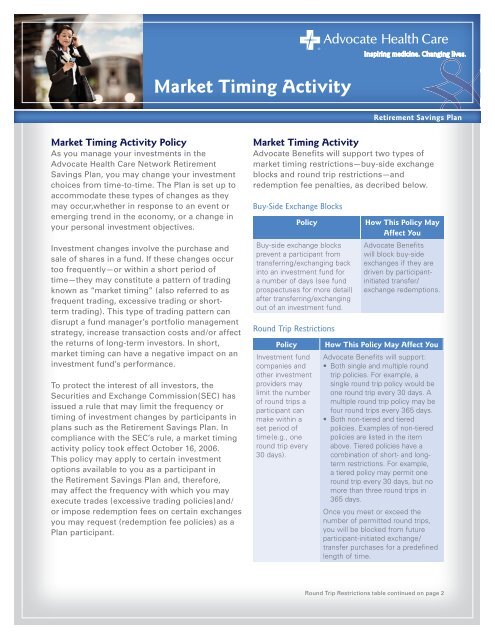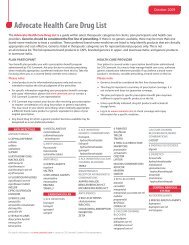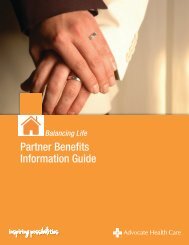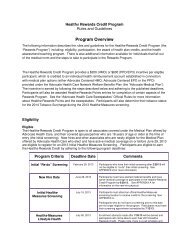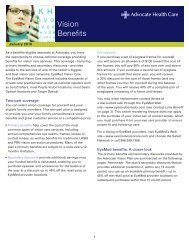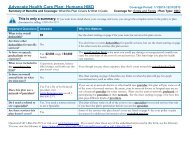Market Timing Activity - Advocate Benefits - Advocate Health Care
Market Timing Activity - Advocate Benefits - Advocate Health Care
Market Timing Activity - Advocate Benefits - Advocate Health Care
Create successful ePaper yourself
Turn your PDF publications into a flip-book with our unique Google optimized e-Paper software.
<strong>Market</strong> <strong>Timing</strong> <strong>Activity</strong><br />
Retirement Savings Plan<br />
<strong>Market</strong> <strong>Timing</strong> <strong>Activity</strong> Policy<br />
As you manage your investments in the<br />
<strong>Advocate</strong> <strong>Health</strong> <strong>Care</strong> Network Retirement<br />
Savings Plan, you may change your investment<br />
choices from time-to-time. The Plan is set up to<br />
accommodate these types of changes as they<br />
may occur,whether in response to an event or<br />
emerging trend in the economy, or a change in<br />
your personal investment objectives.<br />
Investment changes involve the purchase and<br />
sale of shares in a fund. If these changes occur<br />
too frequently—or within a short period of<br />
time—they may constitute a pattern of trading<br />
known as “market timing” (also referred to as<br />
frequent trading, excessive trading or shortterm<br />
trading). This type of trading pattern can<br />
disrupt a fund manager’s portfolio management<br />
strategy, increase transaction costs and/or affect<br />
the returns of long-term investors. In short,<br />
market timing can have a negative impact on an<br />
investment fund’s performance.<br />
To protect the interest of all investors, the<br />
Securities and Exchange Commission(SEC) has<br />
issued a rule that may limit the frequency or<br />
timing of investment changes by participants in<br />
plans such as the Retirement Savings Plan. In<br />
compliance with the SEC’s rule, a market timing<br />
activity policy took effect October 16, 2006.<br />
This policy may apply to certain investment<br />
options available to you as a participant in<br />
the Retirement Savings Plan and, therefore,<br />
may affect the frequency with which you may<br />
execute trades (excessive trading policies)and/<br />
or impose redemption fees on certain exchanges<br />
you may request (redemption fee policies) as a<br />
Plan participant.<br />
<strong>Market</strong> <strong>Timing</strong> <strong>Activity</strong><br />
<strong>Advocate</strong> <strong>Benefits</strong> will support two types of<br />
market timing restrictions—buy-side exchange<br />
blocks and round trip restrictions—and<br />
redemption fee penalties, as decribed below.<br />
Buy-Side Exchange Blocks<br />
Policy<br />
Buy-side exchange blocks<br />
prevent a participant from<br />
transferring/exchanging back<br />
into an investment fund for<br />
a number of days (see fund<br />
prospectuses for more detail)<br />
after transferring/exchanging<br />
out of an investment fund.<br />
Round Trip Restrictions<br />
Policy<br />
Investment fund<br />
companies and<br />
other investment<br />
providers may<br />
limit the number<br />
of round trips a<br />
participant can<br />
make within a<br />
set period of<br />
time(e.g., one<br />
round trip every<br />
30 days).<br />
How This Policy May<br />
Affect You<br />
<strong>Advocate</strong> <strong>Benefits</strong><br />
will block buy-side<br />
exchanges if they are<br />
driven by participantinitiated<br />
transfer/<br />
exchange redemptions.<br />
How This Policy May Affect You<br />
<strong>Advocate</strong> <strong>Benefits</strong> will support:<br />
• Both single and multiple round<br />
trip policies. For example, a<br />
single round trip policy would be<br />
one round trip every 30 days. A<br />
multiple round trip policy may be<br />
four round trips every 365 days.<br />
• Both non-tiered and tiered<br />
policies. Examples of non-tiered<br />
policies are listed in the item<br />
above. Tiered policies have a<br />
combination of short- and longterm<br />
restrictions. For example,<br />
a tiered policy may permit one<br />
round trip every 30 days, but no<br />
more than three round trips in<br />
365 days.<br />
Once you meet or exceed the<br />
number of permitted round trips,<br />
you will be blocked from future<br />
participant-initiated exchange/<br />
transfer purchases for a predefined<br />
length of time.<br />
Round Trip Restrictions table continued on page 2
Round Trip Restrictions table continued from page 1<br />
Policy<br />
Some investment providers may<br />
include a minimum dollar threshold<br />
as part of their excessive trading<br />
policy. In those cases, the dollar<br />
threshold is used to determine if<br />
a participant-initiated exchange/<br />
transfer redemption is counted<br />
as a round trip (i.e., the transaction<br />
requested is included if it exceeds<br />
the threshold; it is not included if it<br />
does not exceed the threshold).<br />
Redemption Fees<br />
Policy<br />
Investment providers may<br />
charge a redemption fee<br />
penalty on investors who<br />
retain shares for less than<br />
a specified period of time.<br />
Q&As<br />
<strong>Market</strong> <strong>Timing</strong><br />
How This Policy<br />
May Affect You<br />
<strong>Advocate</strong> <strong>Benefits</strong><br />
will apply dollar<br />
thresholds within<br />
buy-side exchange<br />
blocks and round<br />
trip policies. For<br />
details, see the<br />
appropriate fund<br />
prospectus.<br />
How This Policy May<br />
Affect You<br />
For certain funds, <strong>Advocate</strong><br />
<strong>Benefits</strong> will assess a<br />
redemption fee on shares<br />
held less than a specified<br />
period of time.<br />
Q. What is <strong>Market</strong> <strong>Timing</strong>?<br />
A. Investment fund companies define market<br />
timing (also referred to as frequent trading,<br />
excessive trading or short-term trading) as<br />
occurring when a participant purchases<br />
and sells mutual fund shares within a set<br />
period of time (as specified in the applicable<br />
plan prospectus).<br />
Q. What types of market timing restriction are<br />
commonly used by investment fund companies?<br />
A. There are two common types of market<br />
timing restrictions:<br />
••<br />
Buy-side exchange blocks prevent a<br />
participant from transferring/exchanging<br />
back into a mutual fund for a specified<br />
number of days after transferring/<br />
exchanging out of that mutual fund.<br />
••<br />
Round trip restrictions state how many<br />
times a participant can transfer/exchange<br />
into and out of a mutual fund within a<br />
specified period of time (e.g., one round trip<br />
every 30 days).<br />
Q. What is a round trip?<br />
A. A round trip is a participant-initiated transfer/<br />
exchange purchase (into a mutual fund) followed<br />
by a participant-initiated transfer/exchange<br />
redemption (out of the same mutual fund).<br />
Q. Are there any other exceptions to buy-side<br />
exchange block and/or round trip policies?<br />
A. There are a few common exceptions. Some<br />
investment fund companies set dollar<br />
thresholds in their excessive trading policies.<br />
Transfer/exchange redemptions:<br />
••<br />
Under the threshold are not considered<br />
market timing and would, therefore, not be<br />
counted toward round trips or considered<br />
for buy-side exchange blocks.<br />
••<br />
Over the threshold will be counted toward<br />
round trips or considered for buy-side<br />
exchange blocks.<br />
In addition, certain exemptions from these<br />
policies may apply to investors who are<br />
participants in an employer-sponsored<br />
retirement plan.<br />
Q. Where can I get detailed information<br />
about the market timing policies for funds<br />
offered through the <strong>Advocate</strong> Retirement<br />
Savings Plan?<br />
A. The most up-to-date information is in<br />
the fund’s prospectus. Information about the<br />
policies being imposed is available online at<br />
www.advocatebenefits.com.<br />
Redemption Fees<br />
Q. What is a short-term redemption fee?<br />
A. A short-term redemption fee is a penalty that<br />
a mutual fund imposes on investors who do<br />
not retain their shares for a specified period<br />
of time. For example, a fund may impose a<br />
2% redemption fee on shares that are not held<br />
for 90 days. If someone buys into the fund on<br />
March 3, then sells those shares 45 days later,<br />
the fund will keep 2% of the sale’s proceeds<br />
because the person did not keep the shares<br />
for the specified 90 day period. Short-term<br />
redemption fee penalties are primarily designed<br />
to reduce market timing and abusive trading.<br />
Q. How does the holding period work?<br />
2
A. If a fund chooses to apply redemption fees,<br />
shares purchased on or after that date must be<br />
held for the entire holding period (as specified<br />
in the fund’s prospectus)to avoid a redemption<br />
fee being applied when those shares are<br />
sold. Any shares purchased prior to the date<br />
redemption fees take effect can be sold at any<br />
time(without regard to the holding period).<br />
Q. How will I know if the Retirement Savings<br />
Plan has a fund with redemption fees?<br />
A. Information on <strong>Advocate</strong> <strong>Benefits</strong>—both<br />
online and by phone—will be updated to let<br />
you know which, if any, funds in the Plan have<br />
redemption fees.<br />
Q. What account methodology will be used?<br />
A. <strong>Advocate</strong> <strong>Benefits</strong> will be using a modified<br />
“first-in, first-out,” or FIFO,methodology.<br />
This means that your “free” shares are<br />
redeemed first. “Free”shares are shares<br />
that were purchased with a transaction that<br />
is not subject to a redemption fee, like a<br />
contribution, or were purchased through a<br />
participant-initiated exchange but held for<br />
the full holding period. Once all “free” share<br />
shave been redeemed, the oldest remaining<br />
shares are redeemed first.<br />
For More Information<br />
More information about an investment fund’s<br />
policies regarding market timing activity<br />
can be found in the fund’s prospectus,<br />
including identification of the period of time<br />
required between purchase and redemption<br />
transactions in order for the transactions<br />
not to trigger restrictions on a participant’s<br />
future transactions and/or redemption fees.<br />
To request a copy of a fund’s prospectus,<br />
you can access the appropriate investment<br />
company web-site or link to the web-site<br />
through <strong>Advocate</strong> <strong>Benefits</strong> (log on at<br />
www.advocatebenefits.com, click on<br />
Retirement <strong>Benefits</strong>, then Fund Information).<br />
This is general information regarding<br />
the rules. As <strong>Advocate</strong> changes fund<br />
managers—and as fund managers review<br />
and update their policies—these rules may<br />
change. As an investor in these funds and a<br />
participant in this Plan, it is your obligation<br />
to familiarize yourself with the rules of the<br />
various fund managers that make up the<br />
various investment options offered through<br />
the Plan.<br />
Q. What redemption fee information will be<br />
available on <strong>Advocate</strong> <strong>Benefits</strong>?<br />
A. <strong>Advocate</strong> <strong>Benefits</strong> will list the funds in the<br />
Retirement Savings Plan’s investment lineup<br />
that have redemption fees and direct you to<br />
the appropriate fund prospectus for<br />
additional information.<br />
3 © <strong>Advocate</strong> <strong>Health</strong> <strong>Care</strong> 5/12


